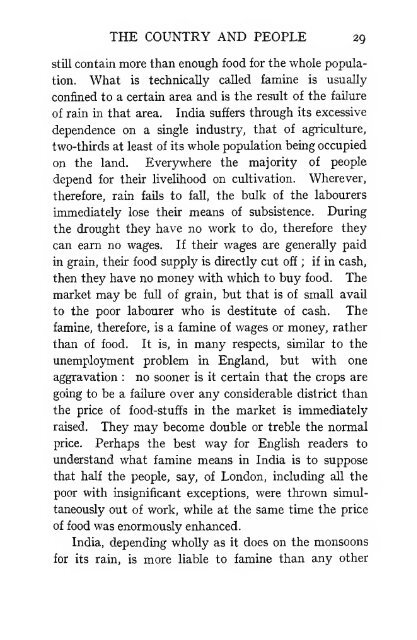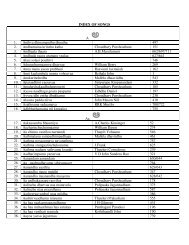Christian missions in the Telugu country - Uecf.net
Christian missions in the Telugu country - Uecf.net
Christian missions in the Telugu country - Uecf.net
Create successful ePaper yourself
Turn your PDF publications into a flip-book with our unique Google optimized e-Paper software.
THE COUNTRY AND PEOPLE 29<br />
still conta<strong>in</strong> more than enough food for <strong>the</strong> whole popula-<br />
tion. What is technically called fam<strong>in</strong>e is usually<br />
conf<strong>in</strong>ed to a certa<strong>in</strong> area and is <strong>the</strong> result of <strong>the</strong> failure<br />
of ra<strong>in</strong> <strong>in</strong> that area. India suffers through its excessive<br />
dependence on a s<strong>in</strong>gle <strong>in</strong>dustry, that of agriculture,<br />
two-thirds at least of its whole population be<strong>in</strong>g occupied<br />
on <strong>the</strong> land. Everywhere <strong>the</strong> majority of people<br />
depend for <strong>the</strong>ir livelihood on cultivation. Wherever,<br />
<strong>the</strong>refore, ra<strong>in</strong> fails to fall, <strong>the</strong> bulk of <strong>the</strong> labourers<br />
unmediately lose <strong>the</strong>ir means of subsistence. Dur<strong>in</strong>g<br />
<strong>the</strong> drought <strong>the</strong>y have no work to do, <strong>the</strong>refore <strong>the</strong>y<br />
can earn no wages. If <strong>the</strong>ir wages are generally paid<br />
<strong>in</strong> gra<strong>in</strong>, <strong>the</strong>ir food supply is directly cut off ; if <strong>in</strong> cash,<br />
<strong>the</strong>n <strong>the</strong>y have no money with which to buy food. The<br />
market may be fuU of gra<strong>in</strong>, but that is of small avail<br />
to <strong>the</strong> poor labourer who is destitute of cash. The<br />
fam<strong>in</strong>e, <strong>the</strong>refore, is a fam<strong>in</strong>e of wages or money, ra<strong>the</strong>r<br />
than of food. It is, <strong>in</strong> many respects, similar to <strong>the</strong><br />
unemployment problem <strong>in</strong> England, but with one<br />
aggravation : no<br />
sooner is it certa<strong>in</strong> that <strong>the</strong> crops are<br />
go<strong>in</strong>g to be a failure over any considerable district than<br />
<strong>the</strong> price of food-stuffs <strong>in</strong> <strong>the</strong> market is immediately<br />
raised. They may become double or treble <strong>the</strong> normal<br />
price. Perhaps <strong>the</strong> best way for English readers to<br />
understand what fam<strong>in</strong>e means <strong>in</strong> India is to suppose<br />
that half <strong>the</strong> people, say, of London, <strong>in</strong>clud<strong>in</strong>g all <strong>the</strong><br />
poor with <strong>in</strong>significant exceptions, were thrown simul-<br />
taneously out of work, while at <strong>the</strong> same time <strong>the</strong> price<br />
of food was enormously enhanced.<br />
India, depend<strong>in</strong>g wholly as it does on <strong>the</strong> monsoons<br />
for its ra<strong>in</strong>, is more liable to fam<strong>in</strong>e than any o<strong>the</strong>r




